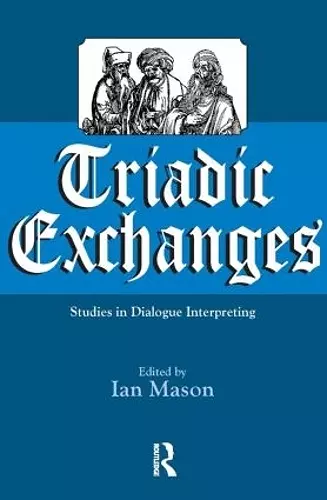Triadic Exchanges
Studies in Dialogue Interpreting
Format:Paperback
Publisher:St Jerome Publishing
Published:1st Jan '01
Currently unavailable, and unfortunately no date known when it will be back
This paperback is available in another edition too:
- Hardback£145.00(9781138151413)

Dialogue interpreting is a generic term covering a diverse range of fields of interpreting which have in common the basic feature of face-to-face interaction between three parties: the interpreter and (at least) two other speakers. The interaction consists of spontaneous dialogue, involving relatively short turns at talk, in two languages. It is usually goal-directed in the sense that there is some outcome to be negotiated.
The studies in this volume cover several different fields: courtroom interpreting, doctor-patient interviews, immigration interviews, etc., and involve a range of different languages: Spanish, Portuguese, Polish, More and Austrian Sign Language. They have in common that they view the interpreter as just one of the parties to this three-way exchange, in which each participant's moves can affect each other participant and thus the outcome of the event.
In Part I, new research directions are explored in studies which piece together evidence of the ways dialogue interpreters actually behave and the effects of their behaviour. This is followed by two studies which discuss traditional interpreter roles - the 'King's Linguist' in Burkina Faso and the Oranda Tsûji, official interpreters employed in isolationist eighteenth-century Japan to ensure contact with the outside world. Finally, issues involved in training are the subject of two chapters relating to Austria and the UK. The variety of aspects and approaches represented in the volume - linguistic, cultural, pragmatic, historical - offer a rich and fascinating overview of the field of dialogue interpreting studies as it now stands.
Dialogue interpreting is a generic term covering a diverse range of fields of interpreting which have in common the basic feature of face-to-face interaction between three parties: the interpreter and (at least) two other speakers. The interaction consists of spontaneous dialogue, involving relatively short turns at talk, in two languages. It is usually goal-directed in the sense that there is some outcome to be negotiated. The studies in this volume cover several different fields: courtroom interpreting, doctor-patient interviews, immigration interviews, etc., and involve a range of different languages: Spanish, Portuguese, Polish, More and Austrian Sign Language. They have in common that they view the interpreter as just one of the parties to this three-way exchange, in which each participant's moves can affect each other participant and thus the outcome of the event. In Part I, new research directions are explored in studies which piece together evidence of the ways dialogue interpreters actually behave and the effects of their behaviour. This is followed by two studies which discuss traditional interpreter roles - the 'King's Linguist' in Burkina Faso and the Oranda Tsuji, official interpreters employed in isolationist eighteenth-century Japan to ensure contact with the outside world. Finally, issues involved in training are the subject of two chapters relating to Austria and the UK. The variety of aspects and approaches represented in the volume - linguistic, cultural, pragmatic, historical - offer a rich and fascinating overview of the field of dialogue interpreting studies as it now stands.
ISBN: 9781900650366
Dimensions: unknown
Weight: 220g
208 pages